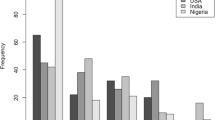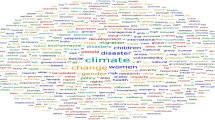Abstract
Global warming will disproportionately affect people of color (e.g., Latinos). Previous research has found that Latinos in the USA are more engaged with global warming than are non-Latino Whites, in part, because they are more likely to perceive it as a serious risk. It was unclear, however, what factors most strongly explain Latinos’ elevated perceptions of risk. This study uses two parallel, nationally representative surveys of Latino and non-Latino White Americans to investigate these different levels of risk perception. Mediation analyses indicate that Latinos’ greater risk perceptions may be explained by (in order of magnitude) their stronger pro-climate injunctive social norms and egalitarian worldviews, stronger identification with the Democratic party, more frequent communication with family outside the USA, greater harm from environmental hazards, stronger descriptive norms, and a weaker individualist worldview. These findings help inform strategies for communicating with different subgroups of Americans that have different global warming risk perceptions.

Similar content being viewed by others
Notes
We use the term “global warming” instead of “climate change” throughout the survey instrument because previous research shows that Americans are substantially more likely to have heard of global warming than climate change (Leiserowitz et al. 2014). Further, using the term global warming makes the current research more of a direct comparison to our previous surveys that use the same question wording. However, we acknowledge that this is a limitation for making inferences regarding perceptions of “climate change” (instead of global warming).
Because of demographic differences between Latino and non-Latino White samples, demographics (gender, age, education, income, and religious affiliation) were included as covariates in all regression and mediation models even if they did not significantly correlate with risk perceptions.
References
Abrahamse W, Steg L (2013) Social influence approaches to encourage resource conservation: a meta-analysis. Glob Environ Chang 23(6):1773–1785
Akerlof K, Maibach EW, Fitzgerald D, Cedeno AY, Neuman C (2013) Do people “personally experience” global warming, and if so how, and does it matter?. Global Environmental Change 23(1):81–91
Anderson CA, Allen JJ., Plante C, Quigley-McBride A, Lovett A, Rokkum JN (2018) The MTurkification of social and personality psychology. Personal Soc Psychol Bull, 0146167218798821
Asch SE (1955) Opinions and social pressure. Sci Am 193(5):31–35
Babcicky P, Seebauer S (2017) The two faces of social capital in private flood mitigation: opposing effects on risk perception, self-efficacy and coping capacity. J Risk Res 20(8):1017–1037
Ballew MT, Goldberg MH, Cutler M, Rosenthal SA, Leiserowitz A (2019) Climate change activism among Latino and White Americans. Front Commun 3(58):1–15
Boas TC, Christenson DP, Glick DM (2020) Recruiting large online samples in the United States and India: Facebook, Mechanical Turk, and Qualtrics. Political Science Research and Methods 8(2):232–250
Burn SM (1991) Social psychology and the stimulation of recycling behaviors: the block leader approach. J Appl Soc Psychol 21(8):611–629
Cialdini RB, Reno RR, Kallgren CA (1990) A focus theory of normative conduct: recycling the concept of norms to reduce littering in public places. J Pers Soc Psychol 58(6):1015–1026
Clark LP, Millet DB, Marshall JD (2014) National patterns in environmental injustice and inequality: outdoor NO2 air pollution in the United States. PLoS One 9(4):e94431
Feldman L, Myers TA, Hmielowski JD, Leiserowitz A (2014) The mutual reinforcement of media selectivity and effects: testing the reinforcing spirals framework in the context of global warming. J Commun 64(4):590–611
Fiedler K, Schott M, Meiser T (2011) What mediation analysis can (not) do. J Exp Soc Psychol 47(6):1231–1236
Flynn J, Slovic P, Mertz CK (1994) Gender, race, and perception of environmental health risks. Risk Anal 14(6):1101–1108
Goldberg MH, van der Linden S, Maibach E, Leiserowitz A (2019) Discussing global warming leads to greater acceptance of climate science. Proc Natl Acad Sci 116(30):14804–14805
Goldberg MH., van der Linden S, Leiserowitz A, Maibach E (2020) Perceived social consensus can reduce ideological biases on climate change. Environ Behav 52(5):495–517
Goldstein NJ, Cialdini RB, Griskevicius V (2008) A room with a viewpoint: using social norms to motivate environmental conservation in hotels. J Consum Res 35(3):472–482
Gustafson A, Rosenthal SA, Ballew MT, Goldberg MH, Bergquist P, Kotcher JE, Maibach E, Leiserowitz A (2019) The development of partisan polarization over the green new deal. Nat Clim Chang 9(12):940–944
Harpham T, Grant E, Thomas E (2002) Measuring social capital within health surveys: key issues. Health Policy Plan 17(1):106–111
Hawthorne G, Elliott P (2005) Imputing cross-sectional missing data: Comparison of common techniques. Aust NZ J Psychiat 39(7):583–590
Hayes AF (2013) Introduction to mediation, moderation, and conditional process analysis: a regression-based approach. Guilford, New York
Holloway RA, Waldrip AM, Ickes W (2009) Evidence that a simpático self-schema accounts for differences in the self-concepts and social behavior of Latinos versus Whites (and Blacks). J Pers Soc Psychol 96(5):1012–1028
Kahan DM, Braman D, Gastil J, Slovic P, Mertz CK (2007) Culture and identity-protective cognition: explaining the white-male effect in risk perception. J Emp Legal Studies 4(3):465–505
La Due Lake R, Huckfeldt R (1998) Social capital, social networks, and political participation. Polit Psychol 19(3):567–584
Leiserowitz AA (2004) Day after tomorrow: study of climate change risk perception. Environ Sci Policy Sustain Dev 46(9):22–39
Leiserowitz A (2006) Climate change risk perception and policy preferences: the role of affect, imagery, and values. Clim Chang 77(1–2):45–72
Leiserowitz A, Akerlof K (2010) Race, ethnicity and public responses to climate change. Yale University and George Mason University, Yale Program on Climate Change Communication, New Haven
Leiserowitz A, Feinberg G, Rosenthal S, Smith N, Anderson A, Roser-Renouf C, Maibach E (2014) What’s in a name? Global warming vs. climate change. Yale University. Yale Program on Climate Change Communication, New Haven
Leiserowitz A, Cutler M, Rosenthal S (2017) Climate change in the Latino mind. Yale University. Yale Program on Climate Change Communication, New Haven
Leiserowitz A, Maibach E, Roser-Renouf C, Rosenthal S, Cutler M, Kotcher J (2018) Climate change in the American mind: March 2018. Yale University and George Mason University. Yale Program on Climate Change Communication, New Haven, CT
Macias T (2016) Ecological assimilation: race, ethnicity, and the inverted gap of environmental concern. Soc Nat Resour 29:3–19
Mohai P, Pellow D, Roberts JT (2009) Environmental justice. Annu Rev Environ Resour 34:405–430
Myers TA (2011) Goodbye, listwise deletion: presenting hot deck imputation as an easy and effective tool for handling missing data. Commun Methods Meas 5(4):297–310
Myers TA, Maibach EW, Roser-Renouf C, Akerlof K, Leiserowitz AA (2013) The relationship between personal experience and belief in the reality of global warming. Nat Clim Chang 3(4):343–347
O’Connor RE, Bard RJ, Fisher A (1999) Risk perceptions, general environmental beliefs, and willingness to address climate change. Risk Anal 19(3):461–471
O'Neill S, Nicholson-Cole S (2009) “Fear won't do it”: promoting positive engagement with climate change through visual and iconic representations. Sci Commun 30:355–379
Paternoster R, Brame R, Mazerolle P, Piquero A (1998) Using the correct statistical test for the equality of regression coefficients. Criminology 36(4):859–866
Patz JA, Campbell-Lendrum D, Holloway T, Foley JA (2005) Impact of regional climate change on human health. Nature 438(7066):310–317
Pearson AR, Ballew MT, Naiman S, Schuldt JP (2017) Race, class, gender and climate change communication. In: Nisbet MC, Ho SS, Markowitz E, O’Neill S, Schäfer MS, Thaker J (eds) The Oxford encyclopedia of climate change communication (Vol. 3). Oxford University Press, Oxford, UK, pp 349–374
Pearson AR, Schuldt JP, Romero-Canyas R, Ballew MT, Larson-Konar D (2018) Diverse segments of the USA public underestimate the environmental concerns of minority and low-income Americans. PNAS 115(49):12429–12434
Pew Research Center (2015) The many dimensions of Hispanic racial identity. https://www.pewsocialtrends.org/2015/06/11/chapter-7-the-many-dimensions-of-hispanic-racial-identity/. Accessed 27 Jan 2020
Pew Research Center (2017) Facts on U.S. Latinos, 2015. http://www.pewhispanic.org/2017/09/18/facts-on-u-s-latinos/. Accessed 29 Oct 2018
Pew Research Center (2018a) A Record 64 Million Americans Live in Multigenerational Households. http://www.pewresearch.org/fact-tank/2018/04/05/a-record-64-million-americans-live-in-multigenerational-households/. Accessed 22 Jan 2019
Pew Research Center (2018b) Wide Gender Gap, Growing Educational Divide in Voters’ Party Identification. http://www.people-press.org/2018/03/20/1-trends-in-party-affiliation-among-demographic-groups/. Accessed 29 Oct 2018
Piurko Y, Schwartz SH, Davidov E (2011) Basic personal values and the meaning of left-right political orientations in 20 countries. Polit Psychol 32(4):537–561
Rios K, Goldberg MH, Totton RR (2018) An informational influence perspective on (non) conformity: perceived knowledgeability increases expression of minority opinions. Commun Res 45(2):241–260
Roth PL (1994) Missing data: a conceptual review for applied psychologists. Pers Psychol 47(3):537–560
Satterfield TA, Mertz CK, Slovic P (2004) Discrimination, vulnerability, and justice in the face of risk. Risk Anal 24:115–129
Schultz PW, Zelezny L (1999) Values as predictors of environmental attitudes: evidence for consistency across 14 countries. J Environ Psychol 19(3):255–265
Smith N, Leiserowitz A (2014) The role of emotion in global warming policy support and opposition. Risk Anal 34(5):937–948
U.S. Census Bureau (2017) Quick facts. Retrieved from https://www.census.gov/quickfacts/fact/table/US/IPE120217
Whittaker M, Segura GM, Bowler S (2005) Racial/ethnic group attitudes toward environmental protection in California: is “environmentalism” still a white phenomenon? Polit Res Q 58:435–447
Witte K (1994) Fear control and danger control: a test of the extended parallel process model (EPPM). Commun Monogr 61(2):113–134
Wyatt RO, Katz E, Kim J (2000) Bridging the spheres: political and personal conversation in public and private spaces. J Commun 50(1):71–92
Zhao X, Lynch JG Jr, Chen Q (2010) Reconsidering baron and Kenny: myths and truths about mediation analysis. J Confl Resolut 37(2):197–206
Zhao X, Leiserowitz AA, Maibach EW, Roser-Renouf C (2011) Attention to science/environment news positively predicts and attention to political news negatively predicts global warming risk perceptions and policy support. J Commun 61(4):713–731
Acknowledgments
This research was supported by the Heising-Simons Foundation, the 11th Hour Project, the Energy Foundation, the Grantham Foundation, and the MacArthur Foundation. The scientific results and conclusions, as well as any views or opinions expressed herein, are those of the authors and do not necessarily reflect those of NOAA or the Department of Commerce.
Author information
Authors and Affiliations
Contributions
AL, SAR, and MJC developed the materials, design, and scope of the study. SAR managed the data and participant recruitment. MHG and AG conducted the statistical analyses with input from MTB. MHG drafted the first draft of the manuscript with input from AG and MTB. All authors contributed to the final version of the manuscript.
Corresponding author
Ethics declarations
Conflict of interest
The authors declare that they have no conflict of interest.
Additional information
Publisher’s note
Springer Nature remains neutral with regard to jurisdictional claims in published maps and institutional affiliations.
Electronic supplementary material
ESM 1
(DOCX 46 kb)
Rights and permissions
About this article
Cite this article
Goldberg, M.H., Gustafson, A., Ballew, M.T. et al. Predictors of global warming risk perceptions among Latino and non-Latino White Americans. Climatic Change 162, 1555–1574 (2020). https://doi.org/10.1007/s10584-020-02728-z
Received:
Accepted:
Published:
Issue Date:
DOI: https://doi.org/10.1007/s10584-020-02728-z




